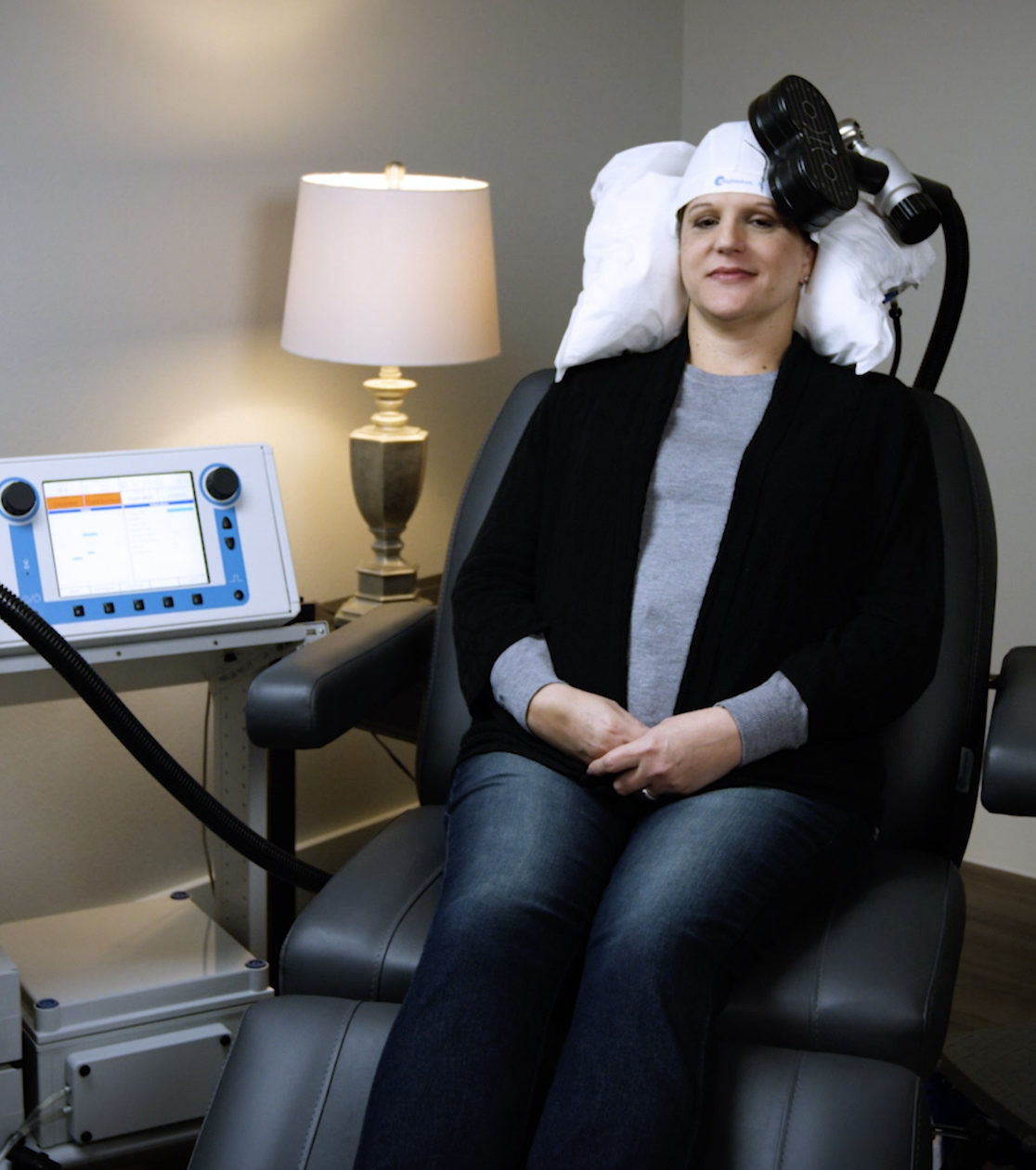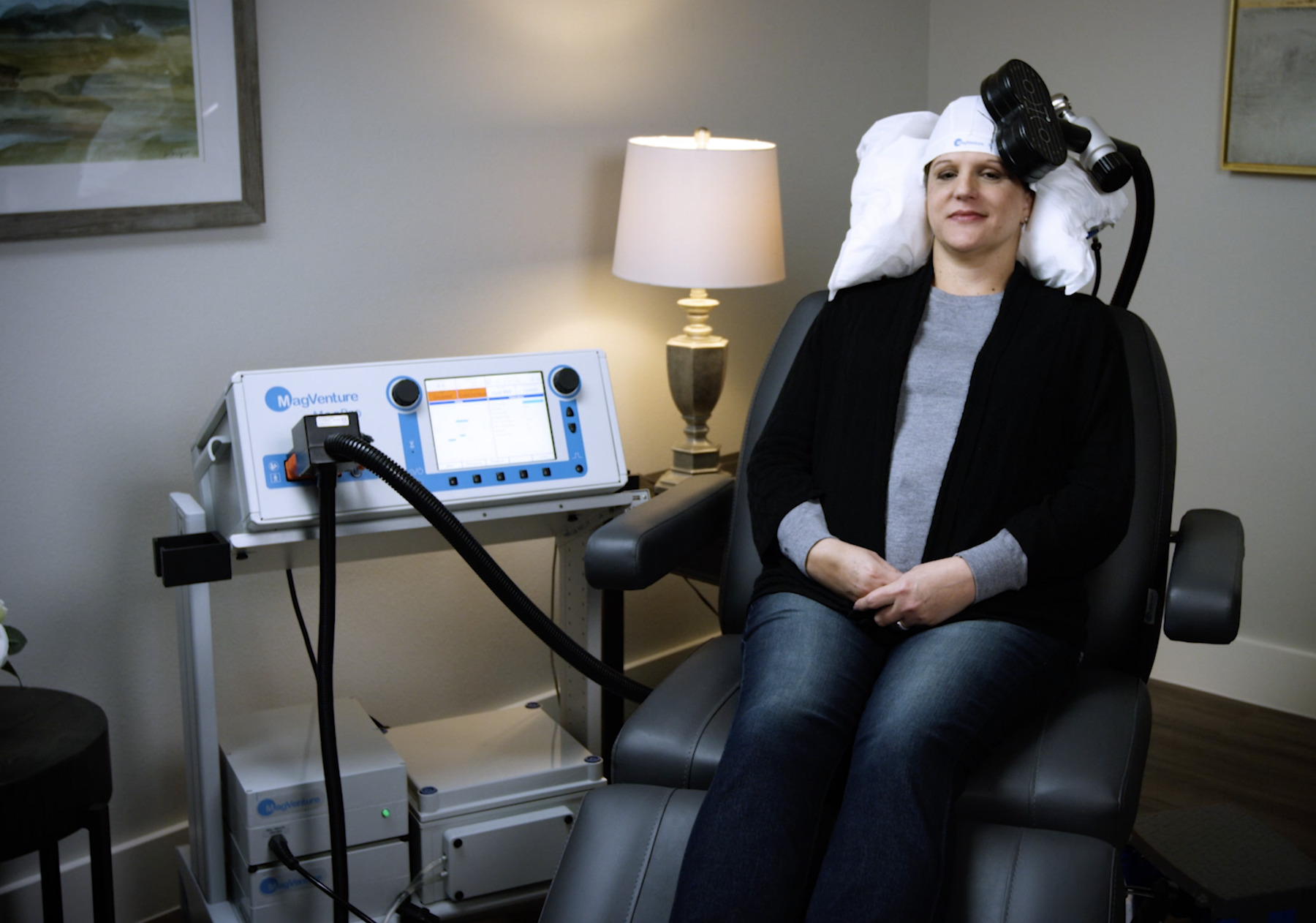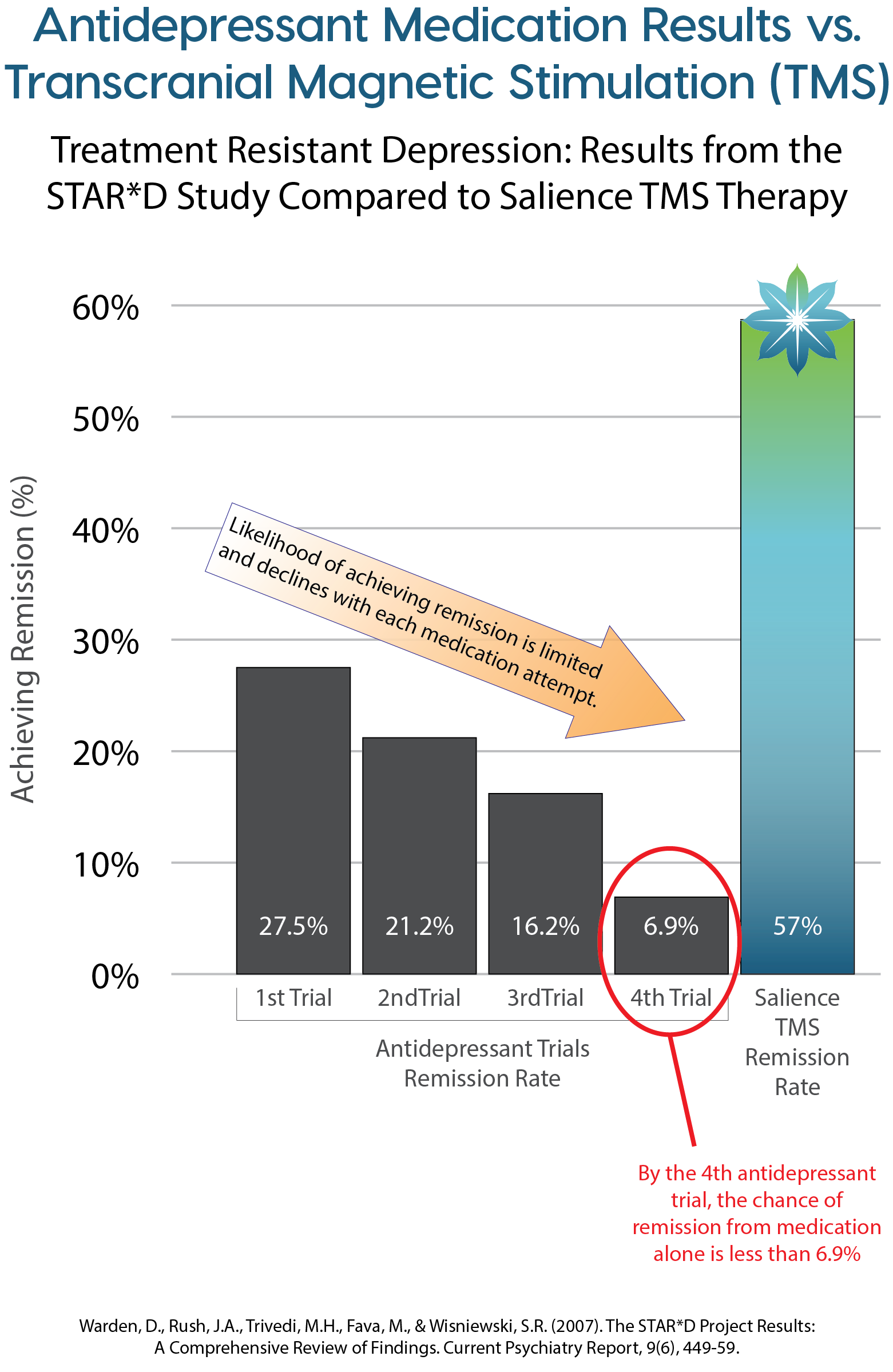TMS Therapy
Transcranial Magnetic Stimulation (TMS) Therapy is a non-invasive treatment that uses gentle magnetic pulses to repetitively strengthen communication in brain networks that control our thoughts, emotions, and behaviors.
TMS Therapy
Transcranial Magnetic Stimulation (TMS) Therapy is a non-invasive treatment that uses gentle magnetic pulses to repetitively strengthen communication in brain networks that control our thoughts, emotions, and behaviors.
TMS Therapy By The Numbers
1985
TMS has been researched and used since 1985. That's over 35 years of medical use.
6.3+
Over 6.3 million treatments have been completed using TMS therapy across the globe.
70+
TMS therapy is currently practiced in over 60 countries across the globe.
5,000+
Over 5,000 research studies have been completed on TMS therapy.
66.8%
Patients reported seeing improvement in their concentration after TMS.
65.9%
Patients reported seeing improvement in their sleep after completing TMS therapy.
Patient Outcome Data for concentration and sleep improvement is based on Patient Health Questionnaire-9 (PHQ9) scores from Salience patients.

How does TMS Work?
Depression can be caused by a disconnection or a lack of engagement of certain parts of the brain along an area called the Salience Network. Think of the Salience Network as the brain's emotional control center. It delivers signals to and from the areas of the brain that determine how we act, react, and respond to situations, thoughts, and feelings.
When these brain networks aren't synchronized, your brain may have difficulty relaying information that can help you to "snap out of" negative thoughts, feelings, and behaviors. When this lack of connectivity happens in the Salience Network repeatedly, people will often experience symptoms of depression, anxiety, sleep problems, cognitive impairment, and difficulty focusing.
TMS is similar to physical therapy for physical rehabilitation. During your outpatient sessions, TMS therapy uses the concept of repetition to build strength and enhance communication to get your brain in the habit of sending signals on its own.
By restoring communication and encouraging positive brain activity in the Salience Network, people often experience improvement with their depression, as well as symptoms associated with anxiety, PTSD, OCD, sleep, attention, and cognition.
How does TMS Work?
Depression disconnects or disengages certain parts of the brain along an area called the Salience Network. Think of the Salience Network as the brain's emotional control center. It delivers signals to and from the areas of the brain that determine how we act, react, and respond to situations, thoughts, and feelings.
When these brain networks aren't synchronized, your brain may have difficulty relaying information that can help you to "snap out of" negative thoughts, feelings, and behaviors. When this lack of connectivity happens in the Salience Network repeatedly, people will often experience symptoms of depression, anxiety, sleep problems, cognitive impairment, and difficulty focusing.
TMS is similar to physical therapy for physical rehabilitation. During your outpatient sessions, TMS therapy uses the concept of repetition to build strength and enhance communication to get your brain in the habit of sending signals on its own.
By restoring communication and encouraging positive brain activity in the Salience Network, people often experience improvement with their depression, as well as symptoms associated with anxiety, PTSD, OCD, sleep, attention, and cognition.

Facts About TMS Therapy

Patients See Improvement in Their Symptoms with TMS Therapy
Salience TMS has helped thousands of patients get relief from depression. According to the STAR*D Study, which focused on treating depression with antidepressant medications, after a patient's fourth antidepressant medication, their chance of achieving remission was less than 6.9%.
Comparing those results with Salience TMS, 55-60% of patients report little to no depression symptoms (remission) at the end of their treatment course.

Patients See Improvement in Their Symptoms with TMS Therapy
Salience TMS has helped thousands of patients get relief from depression. According to the STAR*D Study, which focused on treating depression with antidepressant medications, after a patient's fourth antidepressant medication, their chance of achieving remission was less than 6.9%.
Comparing those results with Salience TMS, 55-60% of patients report little to no depression symptoms (remission) at the end of their treatment course.

FDA Approved for Major Depression and OCD
Transcranial magnetic stimulation is a technology that has been around for over three decades but was FDA-approved in 2008 to treat major depression. Since then, the FDA has additionally cleared OCD, Anxious Depression, and Smoking Cessation to be treated with TMS therapy. In addition to the standard protocols, Dorsal Medial, Theta Burst, and SAINT protocols have also been cleared by the FDA.
Today, TMS technology is a tried-and-true treatment with millions of sessions completed around the globe. If medications and therapy are not enough for your depression, approach TMS therapy confidently.

FDA Approved for Major Depression and OCD
Transcranial magnetic stimulation is a technology that has been around for over three decades but was FDA-approved in 2008 to treat major depression. Since then, the FDA has additionally cleared OCD, Anxious Depression, and Smoking Cessation to be treated with TMS therapy. In addition to the standard protocols, Dorsal Medial, Theta Burst, and SAINT protocols have also been cleared by the FDA.
Today, TMS technology is a tried-and-true treatment with millions of sessions completed around the globe. If medications and therapy are not enough for your depression, approach TMS therapy confidently.
Non-Invasive Treatment
A major benefit of TMS therapy is that it doesn't cause the common side effects associated with antidepressants. That means you don't have to put up with the medication-related side effects like gastrointestinal problems, trouble sleeping, sexual dysfunction, or weight gain.
At Salience TMS, some patients report mild discomfort or headaches during the procedure; however, these effects were reported as temporary.


Non-Invasive Treatment
A major benefit of TMS therapy is that it doesn't cause the common side effects associated with antidepressants. That means you don't have to put up with the medication-related side effects like gastrointestinal problems, trouble sleeping, sexual dysfunction, or weight gain.
At Salience TMS, some patients report mild discomfort or headaches during the procedure; however, these effects were reported as temporary.

We Believe Every Patient Matters
What makes Salience TMS so unique? Our single focus is TMS therapy.
Our care team uses a patient-inspired approach, keeping you educated on what's happening every step of the way. We are research and protocol-driven, meaning our treatment teams are extensively trained in outcome interventions, customized care plans, safety protocols, and the latest science in TMS therapy. At Salience, expect a state-of-the-art TMS therapy treatment and a better healthcare experience.

We Believe Every Patient Matters
What makes Salience TMS so unique? Our single focus is TMS therapy.
Our care team uses a patient-inspired approach, keeping you educated on what's happening every step of the way. We are research and protocol-driven, meaning our treatment teams are extensively trained in outcome interventions, customized care plans, safety protocols, and the latest science in TMS therapy. At Salience, expect a state-of-the-art TMS therapy treatment and a better healthcare experience.
Benefits of TMS Therapy
Benefits of TMS Therapy
Understanding Insurance Coverage for TMS Therapy
Most major insurance companies cover Salience TMS therapy for major depressive disorder and OCD. Our team will coordinate with your health insurance carrier, handle any prior authorization, and make sure you understand your coverage and payment options before treatment.
Understanding Insurance Coverage for TMS Therapy
Most major insurance companies cover Salience TMS therapy for major depressive disorder and OCD. Our team will coordinate with your health insurance carrier, handle any prior authorization, and make sure you understand your coverage and payment options before treatment.
Understanding Insurance Coverage for TMS Therapy
Most major insurance companies cover Salience TMS therapy for major depressive disorder and OCD. Our team will coordinate with your health insurance carrier, handle any prior authorization, and make sure you understand your coverage and payment options before treatment.
Frequently Asked Questions
Yes. Most insurance carriers cover TMS treatment for Major Depressive Disorder and OCD. However, some insurance plans only cover the cost of treatment on a case-by-case basis. Before treatment begins, your personal patient advocate will verify coverage and review your insurance benefits with you, making sure you know the estimated cost before getting started.
A major benefit of TMS treatment is that it doesn't cause the common side effects associated with antidepressants. There are a few potential short term side effects. Some patients report mild discomfort during the procedure, or may have headaches and or fatigue; however, these effects are usually temporary.
Patients are encouraged to stay on their regular prescribed medication throughout the course of treatment. Once treatment is completed, your prescribing physician will determine if your medications can be reduced or changed.
Our average treatment visit lasts around 20 minutes, the length depends upon your needs and customized prescription for TMS Therapy. As a non-invasive form of treatment, there is no downtime. Typically, patients undergo 36 daily treatment sessions over seven weeks, once response is shown, patients can continue to treat to remission.
When treatment is completed as prescribed, there is no evidence that TMS treatment can worsen the symptoms of depression on a permanent basis.

Ready to overcome depression?

Ready to overcome depression?
See If TMS Therapy Is Right For You
Schedule Your Consultation Today






